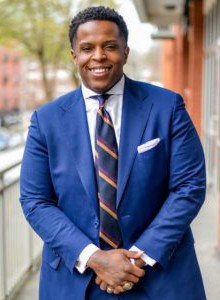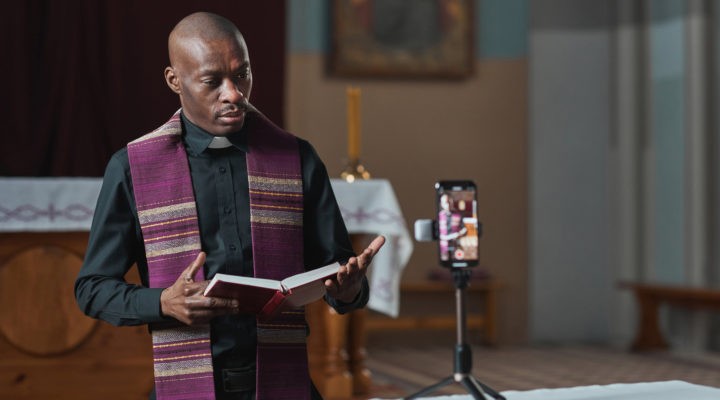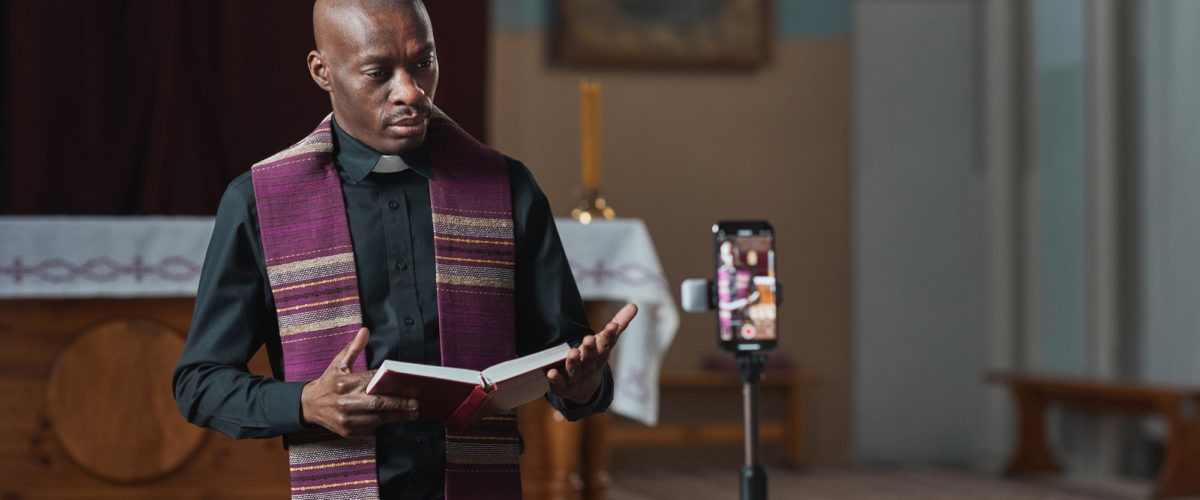Fresh research shows a significant minority of Black Christians favor a mix of online and in-person church options going forward, but a minister known as an expert in hybrid faith expressions predicts the demand will grow as the benefits become clear to ministers and members alike.
“People are interested in having that option, and churches are already generating a significant percentage of their revenue from their streaming audience,” said Kristian Smith, lead pastor of The Faith Community, a multi-racial Cooperative Baptist Fellowship church plant in Atlanta that was launched as a hybrid ministry in 2018.

Kristian Smith
“So, I’m not surprised that after people adjusted to the pandemic they started saying, ‘You know what, I really like engaging virtually,’” said Smith, who also coaches churches and other groups on the benefits of virtual approaches to learning and teaching.
Research recently released by Barna found that 41% of Black churchgoers express a preference for hybrid church models beyond the pandemic.
Two-thirds said digital approaches should be employed in discipleship and spiritual formation, Barna found in the late 2020 survey it conducted with Brianna K. Parker of Black Millennial Cafe, Gloo, Urban Ministries, LEAD.NYC, the American Bible Society and Compassion.
While 47% of Black adults who had attended church in the preceding six months told Barna they favor in-person gatherings, the same percentage said the pandemic left them more open to digital expressions of church.
“Data show that the pandemic pushed Black church pastors to innovate and challenged their ability to disciple people digitally during the pandemic,” Barna said in an online summary of the research. “Even now, as churches emerge from COVID-era regulations, pastors and their people wonder if or how these shifts will continue to shape the trajectory of their ministry strategy.”
But there is resistance to hybrid approaches in both Black and white communities, Smith said. “Where a lot of faith leaders are getting lost is in worrying that if we offer virtual church, the physical space is going to suffer.”
Another concern is that contributions will decrease in hybrid churches, he added. In fact, Barna found that 18% of pastors shared that worry while 58% said giving had increased during the pandemic.
“When we think people need to come to the building for God to be satisfied, then it’s really our egos being satisfied.”
“If people online are contributing and supporting the ministry, then why do I care if it’s generated from online or in person?” Smith said.
And in some cases, pride can block acceptance of online worship and teaching, he added. “We don’t like preaching to the cameras. And when we think people need to come to the building for God to be satisfied, then it’s really our egos being satisfied.”
Smith also cited cultural barriers to virtual worship for some Black preachers. “Generally white churches are not dialogical, but in Black churches it’s call-and-response.”
Polling earlier this year suggests that can, indeed, be a significant factor. In February, Pew Research Center confirmed that expressive forms of worship are much more common in Black Protestant congregations than in other churches, at 99% vs. 81%.
“Spontaneous dancing, jumping or shouting are also parts of religious services more often experienced by attenders of Black Protestant churches (76%) than by those who attend Protestant churches where the congregation and leadership are mostly some other race (37%),” Pew said.
There is generally much less of that kind of expression in online settings, Smith said. “The pandemic has proved we are not going to get that to the same extent, and we have to make that adjustment.”
Pastors shared other concerns with Barna, including 41% who said some members have stopped attending church entirely and 25% who see members being generally less active in the community. Another 24% said young adult attendance has declined.
Barna found that Black churchgoers are emerging from the pandemic with their own set of concerns.
Barna found that Black churchgoers are emerging from the pandemic with their own set of concerns, with its data revealing that “more than one-third of Black church churchgoers felt great concern about the long-term impact of COVID-19 on their church.”
But embracing more virtual practices shouldn’t be one of those concerns, Smith said.
“When sports went on TV, people didn’t stop going to the games. It just gave fans the option of watching on TV or in person,” he said. “It is the same with church. Some people will come sometimes and tune in at others. But for some reason, in church, we think we are exempt from what happens in the rest of society.”
And the benefits are clear, he believes. “You can reach more people by extending your ministry to the rest of the globe. Now your ministry is not limited to a ZIP Code and you can have people from all over the nation and the world together with you.”
Related articles:
The church’s missional focus: Tourist, traveler or pilgrim? | Opinion by Bill Wilson
12 trends for being church in a post-pandemic world | Opinion by Barry Howard
This church was online before online was essential, and they’ve got some lessons to share


